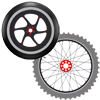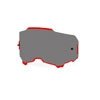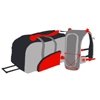Description
Details
ATTENTION: the design of the rear sprocket may be different from the one in the photo according to the number of teeth
Supersprox rear sprocket are developed on world racing fields to meet the requirements of high performance and maximum strength, the particular shape of the teeth increases the durability of the sprocket and improves the grip on the chain.
FEATURES:
High strength steel teeth for extra long life
Central section in aluminum, reduces unsprung masses
Duration at least three times longer than that of other aluminum rear sprockets
50% lighter than steel rear sprockets
FEATURES:
High strength steel teeth for extra long life
Central section in aluminum, reduces unsprung masses
Duration at least three times longer than that of other aluminum rear sprockets
50% lighter than steel rear sprockets
By choosing the ratios, 1 front sprocket cog is equal to about 3 rear sprocket cogs (the exact ratio is given by: number of rear sprocket teeth / number of front sprocket teeth).
The above stated, ratios have to be chosen in a way that a max. difference of 2 cogs is not exceeded. This way, you can always keep the same chain length. The Kawasaki ZX-10R Ninja is an exception: a rear chain with over 1 tooth more than the stock one cannot be used, since length of stock chain will not allow that. Remember that if you want more acceleration you have to mount a rear sprocket with more toothing, or a front sprocket with lower toothing. Ratios have to be necessarily and exclusively chosen by yourself. It is usual to mount a rear sprocket with 2 teeth more than the stock one, but that is however a medium choice which does not mean to be satisfying to everybody.
In a circuit, generally the right final ratio will be that allowing to achieve, at the highest gear, about 200 rpm more than the max power rate, always staying 200 / 300 rpm under the maximum rate the engine can reach. This way, you can take advantage of the trail of the driver who is preceding you.
Choosing the final ratio, remember that the bigger it is, the more the acceleration will be. But if it is too big, you will lose speed. If on the contrary the ratio is too small, you will lose acceleration and will not manage to reach the maximum speed.
The above stated, ratios have to be chosen in a way that a max. difference of 2 cogs is not exceeded. This way, you can always keep the same chain length. The Kawasaki ZX-10R Ninja is an exception: a rear chain with over 1 tooth more than the stock one cannot be used, since length of stock chain will not allow that. Remember that if you want more acceleration you have to mount a rear sprocket with more toothing, or a front sprocket with lower toothing. Ratios have to be necessarily and exclusively chosen by yourself. It is usual to mount a rear sprocket with 2 teeth more than the stock one, but that is however a medium choice which does not mean to be satisfying to everybody.
In a circuit, generally the right final ratio will be that allowing to achieve, at the highest gear, about 200 rpm more than the max power rate, always staying 200 / 300 rpm under the maximum rate the engine can reach. This way, you can take advantage of the trail of the driver who is preceding you.
Choosing the final ratio, remember that the bigger it is, the more the acceleration will be. But if it is too big, you will lose speed. If on the contrary the ratio is too small, you will lose acceleration and will not manage to reach the maximum speed.
If your final transmission has exceeded 5000 km, we advise not to change only one of the three components, but to change them altogether (chain,rear and front sprockets). This, because final transmission would otherwise deteriorate in very few kilometres.
- Compatible model years
- Suzuki V-Strom 650 2007
- Suzuki V-Strom 650 2008
- Suzuki V-Strom 650 2009
- Suzuki V-Strom 650 2010
- Suzuki V-Strom 650 2011
- Suzuki V-Strom 650 2012
- Suzuki V-Strom 650 2013
- Suzuki V-Strom 650 2014
- Suzuki V-Strom 650 2015
- Suzuki V-Strom 650 2016
- Suzuki V-Strom 650 2017
- Suzuki V-Strom 650 2018
- Suzuki V-Strom 650 2019
- Suzuki V-Strom 650 2020
- Suzuki V-Strom 650 2021
- Suzuki V-Strom 650 2022
- Suzuki V-Strom 650 2023
- Suzuki V-Strom 650 2024
Spare part compatible with
Reviews
Product Questions
No Questions







 For your moto
For your moto  Moto Parts
Moto Parts  Alu7075 accessories
Alu7075 accessories  Fairings & Carbon parts
Fairings & Carbon parts  Wheels and tyres
Wheels and tyres  Controls and levers
Controls and levers  Windscreens & windshields
Windscreens & windshields  Brakes
Brakes  Garage & Track
Garage & Track  Electrical parts
Electrical parts  Engine parts
Engine parts  Frame parts
Frame parts  OFF-ROAD plastic kits
OFF-ROAD plastic kits  License plate holder
License plate holder  Protections
Protections  Exhausts
Exhausts  Seats & seat covers
Seats & seat covers  Shocks
Shocks  View mirrors
View mirrors  Trasmission
Trasmission  Products for all Moto
Products for all Moto  Off-Road accessories
Off-Road accessories  Race accessories
Race accessories  Touring accessories
Touring accessories  Accessories Handlebars
Accessories Handlebars  Accessories Electronics
Accessories Electronics  Accessories Brake M.C.
Accessories Brake M.C.  Action Camera
Action Camera  Stickers and Tank pads
Stickers and Tank pads  Anti-theft and Disc Lock
Anti-theft and Disc Lock  Tools and equipment
Tools and equipment  Batteries
Batteries  Chargers and accessories
Chargers and accessories  Chain
Chain  Stands & Ramps
Stands & Ramps  Quick throttle controls
Quick throttle controls  Indicators
Indicators  Lights & Universal light
Lights & Universal light  Grips
Grips  Handlebars
Handlebars  Merchandising & Gadgets
Merchandising & Gadgets  Oil for your bike
Oil for your bike  Brake calipers
Brake calipers  Universal plastics
Universal plastics  Tyres
Tyres  Clutch pump & control
Clutch pump & control  Front brake Master cylinder
Front brake Master cylinder  Rear brake Master cylinder
Rear brake Master cylinder  Clean and care
Clean and care  Spare parts carburetors
Spare parts carburetors  Spare parts
Spare parts  Spare parts for exhaust and silencers 2T
Spare parts for exhaust and silencers 2T  Suspension parts
Suspension parts  Exhaust SC-Project
Exhaust SC-Project  Racing bars
Racing bars  Mirrors
Mirrors  Electronic equipment
Electronic equipment  Tyre warmers
Tyre warmers  Transporting bikes
Transporting bikes  Bolts
Bolts  Gift card
Gift card 
 Oil
Oil  Motor oil 4T
Motor oil 4T  Motor oil 2T
Motor oil 2T  Chain lube
Chain lube  Fork oil
Fork oil  Brake fluid
Brake fluid  Air Filter oil
Air Filter oil  Coolants
Coolants  Sintoflon products
Sintoflon products  Lubrificant & Degreaser
Lubrificant & Degreaser  OFF ROAD gear
OFF ROAD gear  Helmets Off-Road
Helmets Off-Road  Trial Helmets
Trial Helmets  Junior Helmets
Junior Helmets  Off-Road Goggles
Off-Road Goggles  Lens and Accessories's Goggles
Lens and Accessories's Goggles  Gloves
Gloves  Jersey
Jersey  Pants
Pants  Junior Clothing
Junior Clothing  Boots
Boots  Junior Boots
Junior Boots  Socks
Socks  Chest Protector
Chest Protector  Knee guards
Knee guards  Neck protections
Neck protections  Elbow & shoulders protections
Elbow & shoulders protections  Back protectors
Back protectors  Junior protections
Junior protections  Technical Clothing
Technical Clothing  Jackets
Jackets  Rainproof
Rainproof  Clothing cleaners and detergents
Clothing cleaners and detergents  Bag and Backpack
Bag and Backpack  Waist packs
Waist packs  Camelbak Hydration Packs
Camelbak Hydration Packs  ROAD gear
ROAD gear  Helmets full face
Helmets full face  Helmets touring and modular
Helmets touring and modular  Helmets jet and demi-jet
Helmets jet and demi-jet  Junior Helmets
Junior Helmets  Road gloves
Road gloves  Women' s road gloves
Women' s road gloves  Racing Boots
Racing Boots  Touring Boots
Touring Boots  Women's boots
Women's boots  Shoes
Shoes  Women's shoes
Women's shoes  Road jackets
Road jackets  Road pants
Road pants  Technical Clothing
Technical Clothing  Back protectors
Back protectors  Knee sliders
Knee sliders  Rainproof
Rainproof  Casual Clothes
Casual Clothes  Helmet Garmet bags
Helmet Garmet bags  Clothing cleaners and detergents
Clothing cleaners and detergents  Shoes motorcycle
Shoes motorcycle  Bike
Bike  Bike Helmets & Clothing
Bike Helmets & Clothing  Bike Accessories
Bike Accessories  Tools & Maintenance Bike
Tools & Maintenance Bike  Parts & Components Bike
Parts & Components Bike  Gift Card
Gift Card 




































